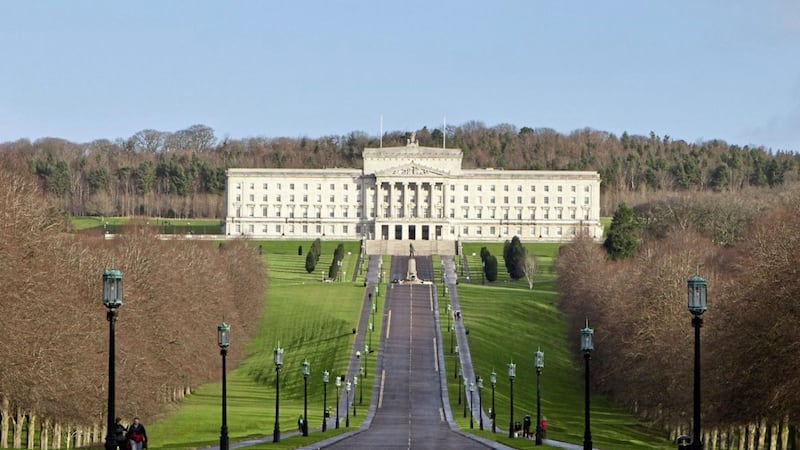Stormont talks will start on December 16, four days after the general election, secretary of state Julian Smith has announced.
That leaves exactly four weeks until January 13, the statutory deadline to restore devolution before an assembly election must be called.
Smith says this is a “real” deadline because the law would have to be changed to move it. However, that has been done four times since Stormont collapsed.
There must be a suspicion the real deadline is for Smith, who is widely believed to be for the chop in the first post-election reshuffle. Would prime minister Boris Johnson really replace his secretary of state for Northern Ireland in the middle of Stormont talks?
For all the absurdity of a talks time-frame that also includes Christmas, New Year and the possible passage of a Brexit withdrawal bill, there is a fresh sense of seriousness about restoring devolution. Yet the more serious the talking, the more likely the deadline is to be moved if necessary. Journalists cursing Smith for ruining their Christmas should not make any plans for Easter.
**
Irish language legislation will be the crux of any Stormont deal and language campaigners are getting their case in early.
The 2018 draft deal between Sinn Féin and the DUP disappointed many activists by dropping demands for bilingual signage, discriminatory job quotas in the public sector, a commissioner with powers of compulsion and a criminal offence of non-cooperation.
Statements from leading campaign groups suggest their minimum requirement from a new deal will be bilingual signage on main roads and town centres and a commissioner who can compel Irish-language public services.
The lack of public debate about what an Irish Language Act might actually contain has at one level been ridiculous. On the other hand, as it is to be stitched up between Sinn Féin and the DUP, what is there for anyone else to discuss?
**
The DUP has two manifestos for the general election: ‘Let’s Get Northern Ireland Moving Again’, launched last week; and ‘Let’s Get the UK Moving Again’, launched this week. The first omitted the DUP’s bridge or tunnel to Scotland idea but did propose a high-speed rail link to Dublin. This apparent outbreak of common sense has been short-lived, however, as the bridge has appeared in this week’s manifesto.
What unionist principle determined that a bridge would get the UK moving but not Northern Ireland? Perhaps the DUP is so convinced of our worth it thinks a fixed link across the North Channel would be entirely to the benefit of Britain.
**
Paul O’Connor, director of the Pat Finucane Centre (PFC), has admitted membership of the IRA in the early 1970s to this newspaper. The matter is now in the hands of the police.
Among those who have since defended O’Connor are the Committee for the Administration of Justice (CAJ), which said his past should not “negate” his subsequent human rights work, and Shankill bomb victim Alan McBride, who said O’Connor had assisted Protestants and unionists.
These comments miss the point. As O’Connor told a Westminster committee in 2005: “It would be wrong for us to seek to portray ourselves as cross-community in the sense that anybody would feel free to approach us. Clearly we are a group that works with the victims of state and loyalist violence.”
The reasons for this approach are now compromised, not that they were ever impressive. Activism is no crime but an organisation that does not uphold rights universally is not a human rights organisation.
**
The UUP is trying to make Troubles legacy a wedge issue between itself and the DUP in the general election, with a focus on the Historical Investigations Unit (HIU) in the Stormont House agreement. Some of the messages sent on this are erroneous to the point of irresponsibility, with the UUP accusing the DUP of signing up to a system that will ignore victims of terrorism and pursue security force personnel beyond the grave.
The truth is that HIU is mainly a reconstitution of the Historical Enquires Team (HET) and will resume its unfinished caseload of 1,700 deaths to cover all Troubles victims.
The real scandal is that HET would have completed this work by now if it had not been shut down, following a republican campaign the PSNI was happy to go along with.
**
Some loyalists have called for the resignation or dismissal of Sinn Féin lord mayor of Belfast John Finucane, currently running for Westminster in North Belfast, after he was cautioned for urinating in an alleyway. These calls are not finding traction in a case most people simply find amusing. In fact, one of the best quips so far was from a loyalist community worker in North Belfast, who tweeted that the lord mayor should be allowed to go to the toilet in public as long as he pulls his chain afterwards.









